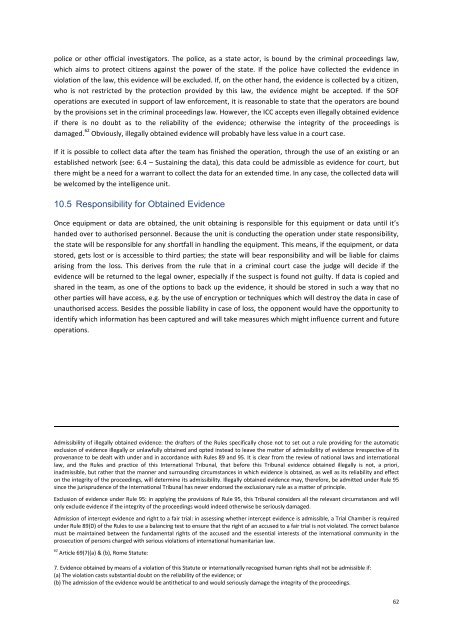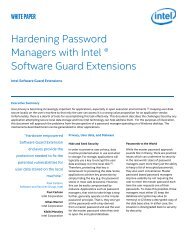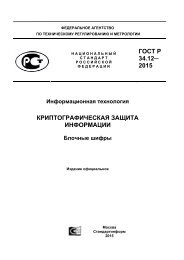BATTLEFIELD DIGITAL FORENSICS
BDF_Battlefield_Digital_Forensics_final
BDF_Battlefield_Digital_Forensics_final
Create successful ePaper yourself
Turn your PDF publications into a flip-book with our unique Google optimized e-Paper software.
police or other official investigators. The police, as a state actor, is bound by the criminal proceedings law,<br />
which aims to protect citizens against the power of the state. If the police have collected the evidence in<br />
violation of the law, this evidence will be excluded. If, on the other hand, the evidence is collected by a citizen,<br />
who is not restricted by the protection provided by this law, the evidence might be accepted. If the SOF<br />
operations are executed in support of law enforcement, it is reasonable to state that the operators are bound<br />
by the provisions set in the criminal proceedings law. However, the ICC accepts even illegally obtained evidence<br />
if there is no doubt as to the reliability of the evidence; otherwise the integrity of the proceedings is<br />
damaged. 62 Obviously, illegally obtained evidence will probably have less value in a court case.<br />
If it is possible to collect data after the team has finished the operation, through the use of an existing or an<br />
established network (see: 6.4 – Sustaining the data), this data could be admissible as evidence for court, but<br />
there might be a need for a warrant to collect the data for an extended time. In any case, the collected data will<br />
be welcomed by the intelligence unit.<br />
10.5 Responsibility for Obtained Evidence<br />
Once equipment or data are obtained, the unit obtaining is responsible for this equipment or data until it’s<br />
handed over to authorised personnel. Because the unit is conducting the operation under state responsibility,<br />
the state will be responsible for any shortfall in handling the equipment. This means, if the equipment, or data<br />
stored, gets lost or is accessible to third parties; the state will bear responsibility and will be liable for claims<br />
arising from the loss. This derives from the rule that in a criminal court case the judge will decide if the<br />
evidence will be returned to the legal owner, especially if the suspect is found not guilty. If data is copied and<br />
shared in the team, as one of the options to back up the evidence, it should be stored in such a way that no<br />
other parties will have access, e.g. by the use of encryption or techniques which will destroy the data in case of<br />
unauthorised access. Besides the possible liability in case of loss, the opponent would have the opportunity to<br />
identify which information has been captured and will take measures which might influence current and future<br />
operations.<br />
Admissibility of illegally obtained evidence: the drafters of the Rules specifically chose not to set out a rule providing for the automatic<br />
exclusion of evidence illegally or unlawfully obtained and opted instead to leave the matter of admissibility of evidence irrespective of its<br />
provenance to be dealt with under and in accordance with Rules 89 and 95. It is clear from the review of national laws and international<br />
law, and the Rules and practice of this International Tribunal, that before this Tribunal evidence obtained illegally is not, a priori,<br />
inadmissible, but rather that the manner and surrounding circumstances in which evidence is obtained, as well as its reliability and effect<br />
on the integrity of the proceedings, will determine its admissibility. Illegally obtained evidence may, therefore, be admitted under Rule 95<br />
since the jurisprudence of the International Tribunal has never endorsed the exclusionary rule as a matter of principle.<br />
Exclusion of evidence under Rule 95: in applying the provisions of Rule 95, this Tribunal considers all the relevant circumstances and will<br />
only exclude evidence if the integrity of the proceedings would indeed otherwise be seriously damaged.<br />
Admission of intercept evidence and right to a fair trial: in assessing whether intercept evidence is admissible, a Trial Chamber is required<br />
under Rule 89(D) of the Rules to use a balancing test to ensure that the right of an accused to a fair trial is not violated. The correct balance<br />
must be maintained between the fundamental rights of the accused and the essential interests of the international community in the<br />
prosecution of persons charged with serious violations of international humanitarian law.<br />
62 Article 69(7)(a) & (b), Rome Statute:<br />
7. Evidence obtained by means of a violation of this Statute or internationally recognised human rights shall not be admissible if:<br />
(a) The violation casts substantial doubt on the reliability of the evidence; or<br />
(b) The admission of the evidence would be antithetical to and would seriously damage the integrity of the proceedings.<br />
62





